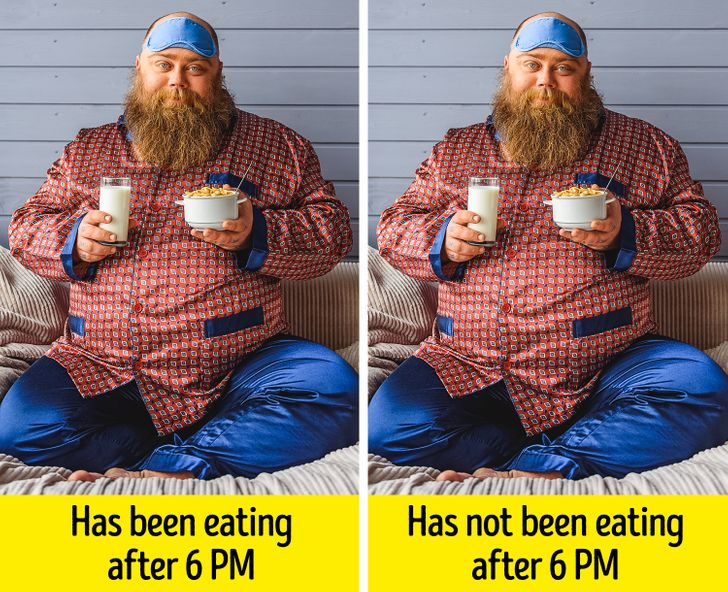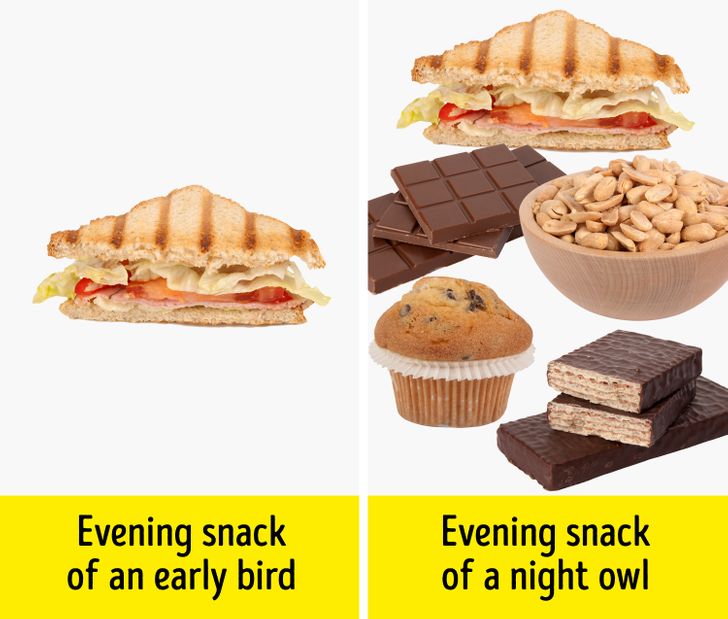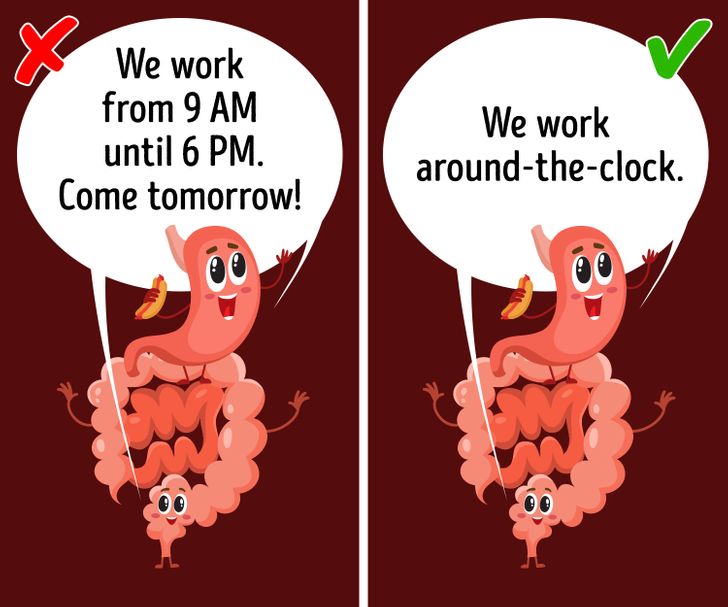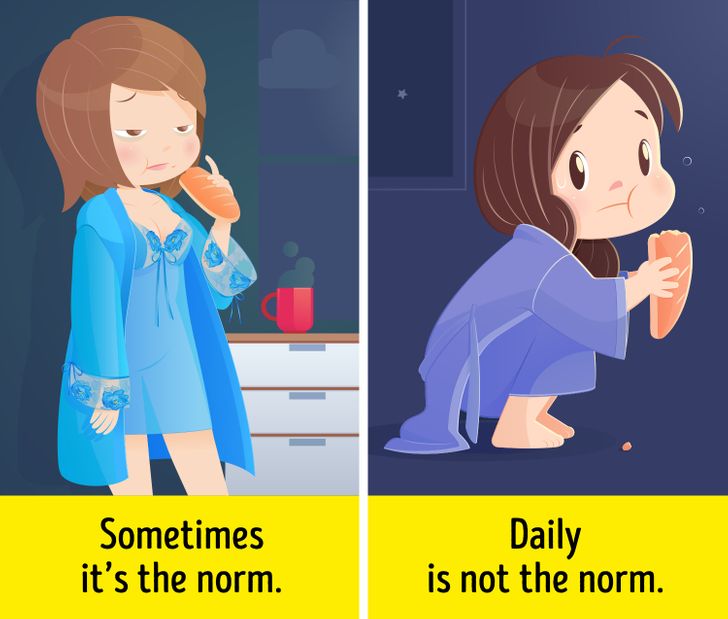We’ve probably all heard the phrase “Don’t eat after 6 PM.” This rule has different explanations and one of the main ones is that all the food you eat after 6 pm turns into fat overnight or is not digested. But most people finish their workday at 6 p.m. and come home even later.
Does that mean they should refuse dinner to stay in good shape and have a healthy stomach? And what should night owls or those who work unconventionally do? We decided to find out if late dinners are really bad and make people gain weight.
Should You Eat Before Bed?
The Connection Between Late Evening Snacks And Extra Weight

No one is sure where the opinion comes from that food eaten after 6 p.m. turns into fat. But even after a lot of research has been done on this topic, the results still seem controversial.
For example, in one of the experiments, a group of healthy men stopped consuming food between 7:00 p.m. and 6:00 a.m. Each of the examinees lost about 1 pound in 2 weeks. The participants then returned to their usual late dinners and regained the lost weight.
In another experiment, one group of subjects consumed more calories at dinner and the other at lunch. It was the first group that showed better results.
So Why Do We Gain Weight?

One thing is clear — food eaten at night does not turn into fat. A person gets fat when they eat a lot but moves very little. They consume more energy than they use. This means that it is the number of calories consumed that affects the extra weight and not the time for dinner.
People who tend to eat at night consume more food during the day than those who go to bed early and limit food intake before bed.
Scientists from Northwestern University, USA, were observing 2 groups of people. Participants in the first group went to bed at midnight and woke up at 8 am, while the second group consisted of night owls.
The latter consumed more calories per day, mainly from dinners and late-night snacks. It is important to note that those examined in the night group ate more fast food but fewer vegetables and fruits.
During another experiment, examinees maintained a special diet during the day but were able to eat chocolate from vending machines at night. Those who used this “chocolate” option gained weight, and the chocolate bars they bought came to represent about 15% of their daily consumption.
That’s probably why the rule to eat after 6 pm came about. It is the night when mindful eating becomes a difficult task. People come home from work tired and hungry, so they cook and eat quickly.
Also, one of the most popular after-work activities is watching a television series, which is usually followed by potato chips or other snacks. Also, if you suddenly find out late at night that all your household items are gone, you are likely to order pizza instead of going to the supermarket to buy vegetables.
Even the joke of looking in the refrigerator every 10 minutes to see if something tasty has appeared there is very indicative of that because many times we have nothing to do and this boredom makes you want to chew something.
Scientists confirm that nocturnal people sleep about 1 hour less than early risers and have more opportunities to overeat. This means they have more time to eat, a greater sensitivity to food rewards, changes in appetite hormones, and a need to maintain energy due to lack of sleep.
Does Food Get Digested At Night?

Yes of course! Our digestive tract does not stop working during sleep, either during the day or at night. Many health professionals say that a person’s metabolism naturally slows down overnight. However, research has shown that these changes in overnight metabolic rate are negligible.
Food And Sleep Quality

The food we eat affects the quality of our sleep. Research has shown that saturated fats (from animal sources) keep you from falling asleep and make you feel more restless. Other factors such as alcohol, caffeine, and sugar also negatively affect the quality of sleep.
That’s when people who enjoy late-night snacks run the risk of entering a vicious cycle. Sleep disturbances can develop due to overeating, while lack of sleep must be compensated for by energy received from food throughout the day.
Also, lack of sleep affects susceptibility to food stimuli or simply makes it difficult for a person to refuse a second piece of cake after lunch or a cookie before bed.
“I Go To Sleep Late. Can I Eat After 6 Pm? How About Eating Before Going To Sleep?”

You can eat after 6 pm if you don’t go to bed by 8 pm. If you are overweight, watch your total calorie intake during the day, because it is not only at night, but also during the day, that you can overeat.
If you notice that you are eating too much before bed, think about why you are eating too much.
It could be related to emotional problems. Binge eating is a need to always chew something to block out anxiety or guilt.
Overeating at night can be a habit that arises from boredom or lack of activity. All you need to do here is turn on your willpower and stop mindlessly snacking. This will give you more control over your meal schedule.
Overeating at night is often due to a poor breakfast or lunch. If you haven’t eaten enough during the day, you will obviously be hungry at night.
Try dinner or snack 2.5 to 3 hours before bed. Avoid foods that make you fat. If you start to feel hungry after going to bed, don’t ignore this sign, but try to prefer fruit and plain yogurt instead of a sandwich.
Experts recommend consuming products that promote the production of melatonin and serotonin at night. These can be found in dairy products, fish, turkeys, bananas, kiwis, cherries, almonds, and honey.
If you have diabetes or acid reflux, schedule a meal with your doctor.
How often do you snack at night? What do you usually eat? Let us know in the comments!


